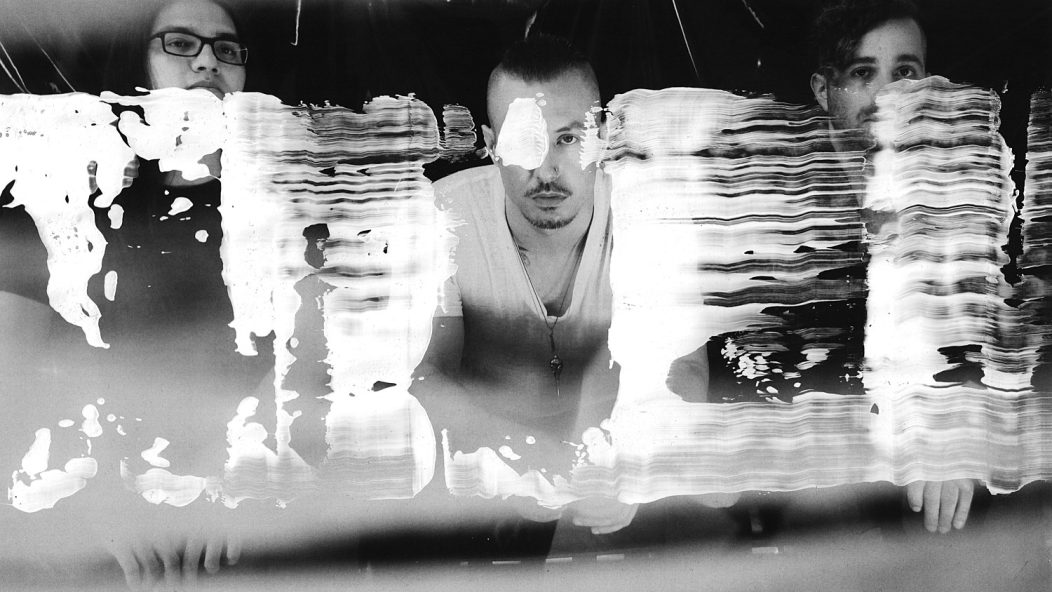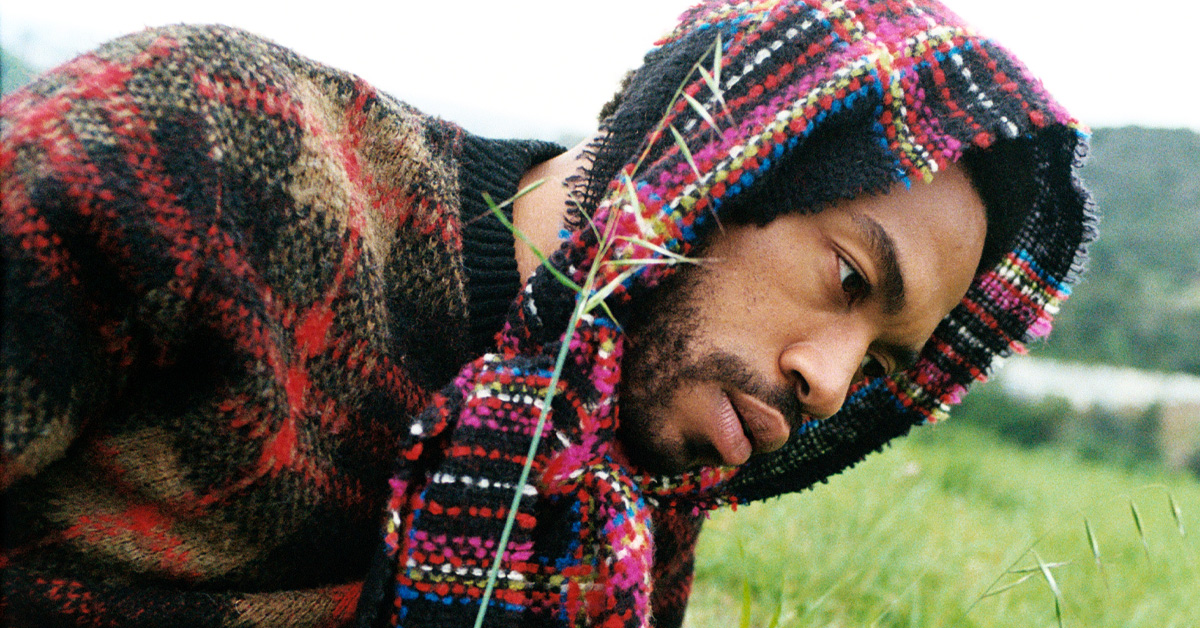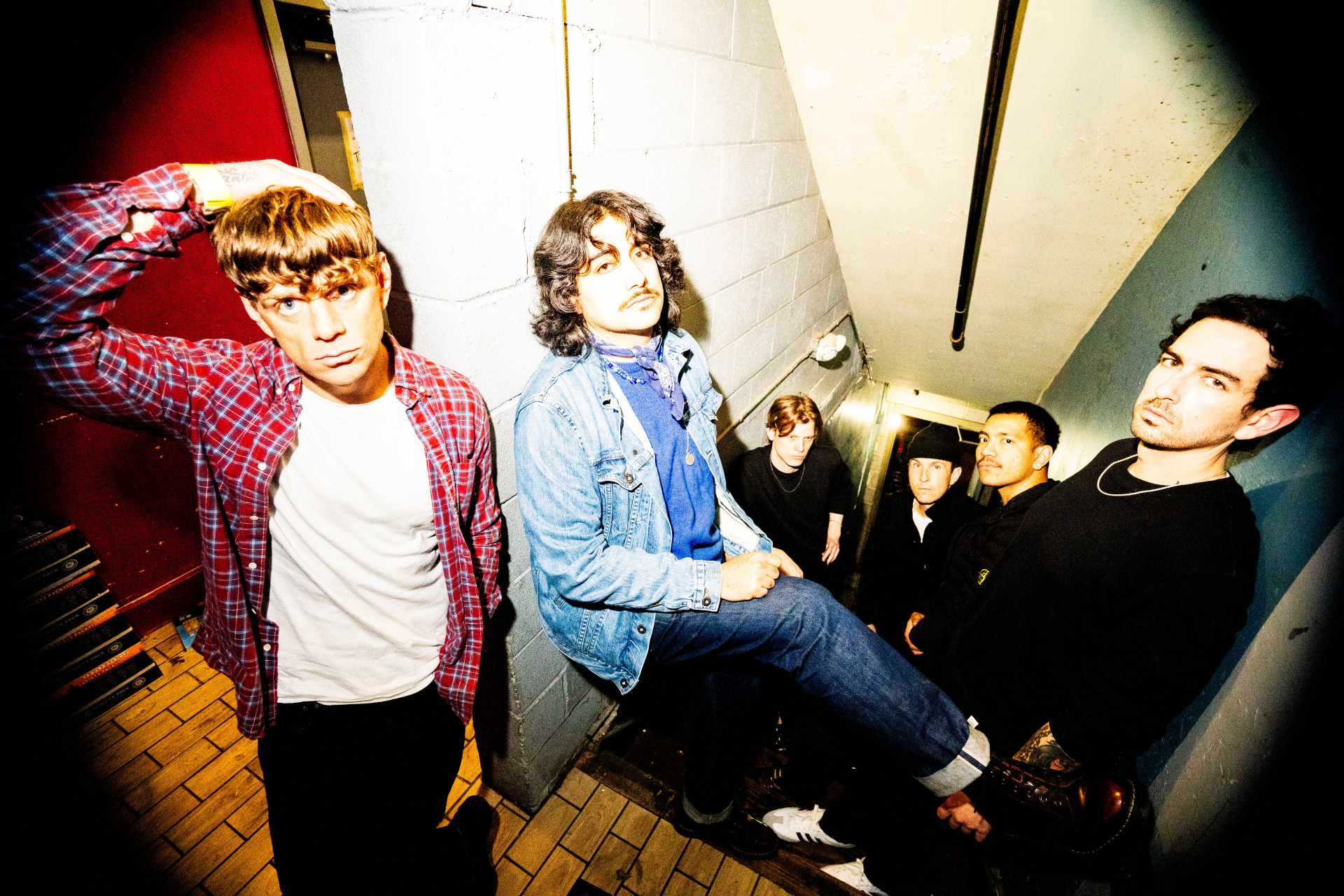
Interview: The Black Queen

…
Chill trap, midnight driving music with ’80s flow, deliciously dark and mystical, addictive – those are some of the descriptions one can find for The Black Queen’s music. Intrigued yet? Turn down the light and plug in your headphones.
…
…
A band of mystery, The Black Queen began their world takeover a year ago when the trio – Greg Puciato (The Dillinger Escape Plan) Joshua Eustis (Telefon Tel Aviv), and Steven Alexander (The Dillinger Escape Plan, Nine Inch Nails) – released their first single “The End Where We Start.” While many recognized the voice of the singer – one of the best metal and vocalists currently out there – the slow-motion ambient sound fused with electronic beats and clanging rhythms almost puts a listener in a time machine and sends them back to the ’80s, borrowing some elements from 2015 and carefully injecting them into the new synth-pop compilation. Though light sounding, the project is deeply personal for the band members who took The Black Queen as an outlet for personal struggles of the past few years. Emotional, melancholic and delicate, the band’s music takes you on an intimate journey through losing yourself.
Their debut album, Fever Daydream, was released in January, but the idea for the band was born as early as 2010 and was kept secret for almost five years. Puciato and Alexander experimented with the style of their future project with their first demos ranging from “super downtempo sparse Massive Attack stylized beats to shoegazey punk noise.”
“I think we had the name of both the band and the album, and the symbol, as early as 2012,” Puciato explained. “It was really interesting, to know what you are making as you are making it, for that long, and without anyone else knowing except for people close to you. It made us more protective of it.”
The band has already played their first two sold-out shows in Los Angeles and London, and are embarking on a European tour in the fall, with a few UK and even a Russian date already announced. But before that they hit the Cold Waves festival in Chicago in September.
…
When you first got together did you know right away that you guys had something special, some kind of chemistry going on between you?
Steve: Greg and I have known each other over ten years. I would go to Dillinger shows quite often and talk to the guys. Josh and I corresponded via email for years before we actually met. When we all got in a room it felt like we had known each other since we were kids.
Greg: In 2007 Steve and I slept in the same bed in an extended stay hotel room for like two straight months, haha.
Steve: [laughs] We all played the same video games growing up and that solidified the friendship.
You all come from various musical backgrounds – there’s metal, industrial, electronics – yet The Black Queen sound has dark R&B and electro-pop vibes. How did it come together?
Steve: We share a deep love of R&B and hip hop, art pop ’80s, and even death metal. For me especially I love music producers. My favorite ones can make something that should seem like sugary pop actually sound big and aggressive and sexy. Or producers that create a conceptual space that doesn’t exist in the real world. These guys influenced my contributions to Fever Daydream: Jimmy Jam & Terry Lewis, Trevor Horn, Brian Eno, Daniel Lanois, Phil Spector, Mutt Lange. There’s probably a handful more.
Greg: I think letting the whole thing incubate and taking as long as we did helped find a lot of the musical common ground naturally, instead of deciding what you wanna make stylistically ahead of time and then trying to force that. The length of time allowed everything to come to the surface and common ground to reveal itself in a really organic way.
In some of your earlier interviews you mentioned that you were at a transitional stage in your lives when you started working on The Black Queen and that the project served as an outlet for some of those deeper, darker emotions. Was this something you all were going through? And how did this reflect in your music?
Steve: I remember the day Josh and I got called to play and work with Nine Inch Nails. We were in the studio and went outside for a break. There was a murder of crows flying around outside, hundreds of them. I wouldn’t say any of us are superstitious but we looked at each other and knew something was coming. Death symbolizing change? We all moved into a new place that year and people who were a part of our lives were no longer.
Greg: The whole last few years was a gigantic roller coaster of alternating or simultaneous trauma and discovery for each of us. I’ve said it before but the album and even just hanging out became a sort of group lighthouse when shit was bleak. The whole long time period was sort of a “dark night of the soul” period, and this more or less soundtracked that. Alternating beauty and dread, hope and emptiness, love and loss.
What did the album recording process look like? How much work was done in the studio and how much outside of it? Are there any fun stories to share?
Steve: I tend to work alone and in secret. For me my favorite songs figure out a way to be not only great songs but also utilize production to give more impact to the message.
“The End Where We Start” […] Greg and Josh had been working on that song by themselves and got it to a good place. I believe the beat and keyboards and a temporary vocal track were in place except it was missing some key ingredients. The track sounded like snow to me. I was in Mexico City at the time they sent the track. I loved how hot the city was and was thinking about the snow vs. heat contrast. I ended up recording all the guitars and the solo in my hotel room that night.
On “Distanced,” Josh and I were asked to submit a song for a famous singer who I cannot name. We had something pretty good and decided to try to use it ourselves if the artist wouldn’t take it. One night Greg opened the session while Josh and I weren’t around and clicked something that changed the entire beat. When we got back we we were sort of confused but it made the song something special.
Happy accidents are the best stuff.
What was the first instrument you fell in love with?
Steve: I was around music growing up as my dad played drums and toured with a band. I started to play saxophone and piano when I young but wanted to experiment instead of playing what the teacher wanted. I remember electric guitar being what I needed in my life. I loved being able to bend strings or use pedals to create new sounds. And it seemed new and exciting at ten years old.
Greg: I played trumpet in like 2nd grade but I didn’t care about it, then between then and 5th grade I had discovered rock,thrash and alternative, and had started playing guitar and singing. I remember I would look through the Musician’s Friend catalogues and everything just seemed mystical to me. Like if I could only get that pedal or that amp or that stuff or that thing…as if they were all magical objects.
…
…
Your music videos are quite something too. Take “Ice To Never.” What’s the story behind it?
Greg: Steve and I came up with the initial concept for “Ice To Never,” which originally had a bit more of a story element involving a magical boombox washing up on the shore, possessing him and anyone else it came in contact with, and then possessing him to return it straight into the sea. Then, by the end we made it all more abstract, and then yeah, obviously Rob (Sheridan) was all of the execution, direction, editing etc…
Steve: “Ice to Never” was so much fun to film. I walked down all of Skid Row with that boombox while Rob filmed by my side. Everyone was very receptive and smiling. The guy dancing in the video came up to us out of nowhere and blew our minds. I am still sort of bummed I lost one of the boomboxes in the ocean and ruined my favorite leather jacket and boots in the ocean. Haha.
Greg: The outtakes of Steve just getting destroyed by water over and over are priceless. There’s one in particular where Rob is uncontrollably laughing right at the moment of annihilation.
Steve: [Laughs] Well, what Rob didn’t tell me is that the camera died in the middle of the second ocean take. And he made me do a third one even after. I was so waterlogged I had to be dragged out of the water or be swept away.
Those three elements that form a reversed triangle in your logo – what is the story behind that image?
Steve: I can’t tell you the secret intended message but it has something to do with sacred geometry and numbers.
Some of your fans went as far as tattooing this symbol. What do you think about this kind of dedication?
Steve: It’s very inspiring and makes me want to play more shows and create.
Greg: It’s really incredible and hard to explain. Because this whole thing was conceived from nothing and executed completely nearly 100% ourselves, over like we said, such a long period, that seeing it mean something to other people in such a visceral way is really inspiring.
Who writes the lyrics at The Black Queen? What is the main lyrical theme and what serves as an inspiration?
Greg: I wrote the bulk of them. Steve wrote part of the chorus in “Maybe,” or he’ll suggest a word change or some other element. But it’s tough to say that definitively because we influence each other in less overt ways, so maybe I wrote the lyrics but maybe I wouldn’t have written them if Steve hadn’t sent me some article or told me to watch this thing, or maybe we wouldn’t have had a certain conversation. When you’re writing lyrics or music in any situation you’re documenting or recording them really, you kinda have to give credit to the experiences that helped them form, especially if you are in a close creative relationship with other people during the writing. So yeah, I wrote most of them technically but everything has been some sort of group effort. Most of the album is just experience-based, relationship-based to me. Longing, love, lust, loss, limerence, depression, jubilation, reflection. They usually either reference specific moments or emotions related to certain moments or people or situations in my life. Nothing is really topical, it’s all some degree of autobiography.
Steve: As far as lyrics or even the music writing duties go, we don’t hold everything so dear that it becomes a conflict. If a word feels better we go that way. Or changing a chord or which instrument we use for a part. Whatever makes the whole better.
“I ran so far I didn’t know it was me” is probably one of my favorite lines from the album. It is so easy to relate to. How was it born?
Greg: From just looking around at yourself and your surroundings and taking stock and feeling like you don’t know where you are, and you realize that you’re really far out in the woods. You get to a point in your life when you realize that a lot of the energy you’ve spent you were running away from things. You delude yourself into thinking you’re running towards something or just running aimlessly, but really there is something propelling you. That thing is often something that you don’t realize, that you’re avoiding, that you’re reacting to, usually self destructive coping mechanisms going hand in hand with all of that energy… until life forces you to confront those things in some really blunt and unavoidable way, like near death.
Your first two shows – LA and London – were both sold out. What was it like realising that people are striving to hear your music live?
Greg: Again, indescribable. New York just sold out too [This interview took place prior to the band’s show at Rough Trade NYC, on June 4- Ed.]. I’m always the person, in anything I’ve ever been a part of, who has a hard time understanding that things I’ve made exist in the world, that anyone cares. I always think nobody is gonna be at the show. Not because I think what we created isn’t good, but because I just can’t understand how something so personal that you work on for so long is actually physically out and that anyone cares. It’s a really strange thing for me, I just have a really hard time connecting those two things. For this, even more so, because it’s such a vulnerable record and we took so long with it…so personal and protective over it etc…it’s just so full-on feeling to see people care or know words or show up or just anything. We were so hands on with the initial “deployment” of everything physical too, which I’m really happy about in hindsight because those people aren’t just numbers to me. A lot of time and care and hard work went into sending them things. That core is forever.
Steve: It was like seeing your child take their first steps. Surreal to me. I’ve been on the other side of things for a long time as technician for bands and artists for almost ten years. Being behind the curtain can make you jaded because you see the magic trick constantly. Playing live made me appreciate music in a way I haven’t in awhile. Seeing all the people come together, whether it’s one hundred people or one hundred thousand, to see the same thing is great feeling.
…











